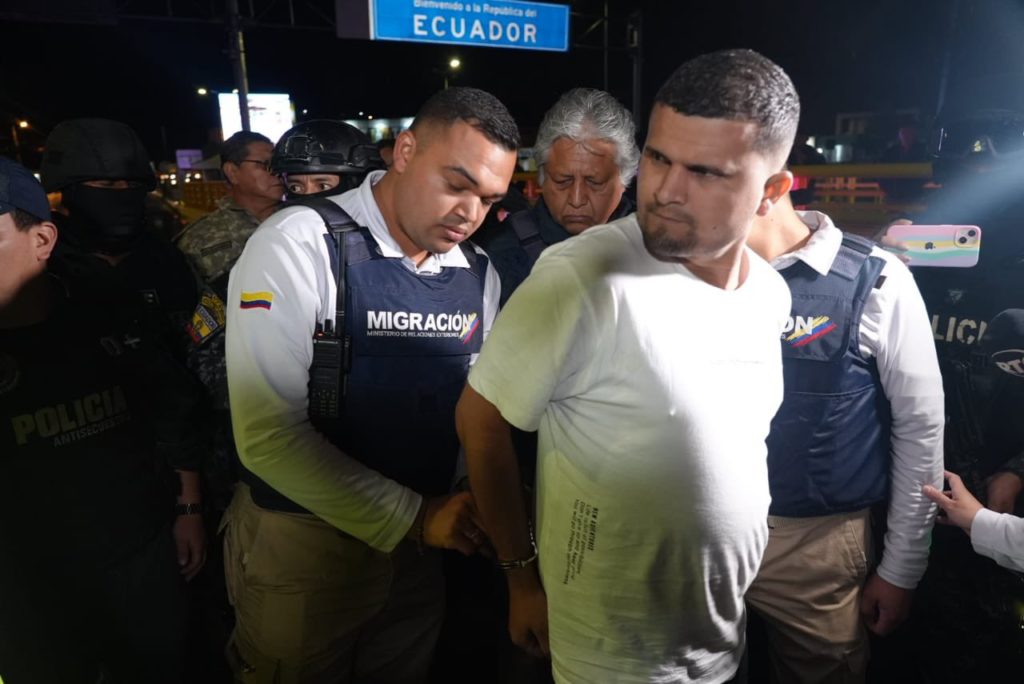
Latin America is notorious for its long history of criminal organizations, ranging from drug cartels like the Colombian Medellin Cartel or the Mexican Cartel Jalisco Nueva Generacion, (CJNG) to gangs and crime syndicates like the Salvadorian Mara Salvatrucha and the Brazilian Comando Vermelho. In recent years, a new criminal group has emerged as a regional threat: Tren de Aragua (Train of Aragua). Created in the Penitentiary Center of Aragua, in Venezuela, the gang has rapidly expanded right across Latin America by taking advantage of migrant flows, and now poses serious security threats in major cities of the subcontinent.
Due to its geographical proximity with Colombia, the Tren de Aragua has begun to extend its activities within the country, even starting to compete and clash with local armed groups like the Gulf Clan (Clan Del Golfo) and the far-left guerrilla groups ELN and FARC.
Straight out of jail, the origins of Tren de Aragua
Tren de Aragua was founded by Hector Rusthenford Guerrero Flores, a Venezuelan criminal born in Maracay, Aragua State, in 1983. Known as ‘Niño Guerrero’ (Warrior Child), Hector Guerrero started his criminal career as a teenager, first as a drug trafficker and later as a hitman. Incarcerated in 2010 for homicide and drug trafficking, he managed to escape in 2012 but was recaptured a few months later in 2013. During this second incarceration, he formed Tren de Aragua, an alliance between various criminal gangs present in the Penitentiary Center of Aragua, known as Tocoron Prison.
From there, Tren de Aragua gradually expanded its operations throughout Venezuela, notably in Caracas and other major cities. Within just a few years, Tren de Aragua emerged as the most powerful criminal organization in Venezuela, controlling the country’s drug trafficking routes, particularly to Trinidad and Tobago, a key transit point for cocaine destined for the US and Europe.
Venezuelan authorities and the rise of Tren de Aragua
Behind the gang’s impressive rise is the failure and complicity of the Venezuelan government. Indeed, the Venezuelan prison system has been in crisis for decades, with prisons progressively falling under the authority of criminal gangs, a situation worsened under President Nicolas Maduro’s rule. Confronted with a severe economic crisis and state bankruptcy, leading to a crisis of legitimacy, Nicolas Maduro’s government was compelled to collaborate with the criminal underworld to sustain its precarious hold on power. As such, during the 2018 protests, the government arranged for criminal gangs, including Tren de Aragua, to repress the protesters. In return, Tren de Aragua was allowed to expand and continue its criminal activities.
A striking example of this collusion is the Tocoron prison itself. Reminiscent of ‘La Catedral’, Pablo Escobar’s infamous prison, the prison turned into a resort for criminals, with a swimming pool, a games room, a baseball field, and even ATMs, a zoo and a locally famous nightclub, ‘Tokyo’. These entertainments were funded by extorting other inmates, charging US$15 a week, and additional fees for using the resort-like prison’s facilities.
A regional expansion
From his headquarters in Tocoron, Niño Guerrero also expanded his gang’s operations throughout South America. Indeed, Tren de Aragua took advantage of the Venezuelan exodus, infiltrating migrant flows to establish local cells in various host countries, particularly Colombia, Chile, Peru, Ecuador, Bolivia, and also Brazil and Panama. Within a decade, Tren de Aragua transformed from a local prison gang into a transnational criminal organization.
As such, the Venezuelan gang engages in a wide range of illicit activities, including drug trafficking, sexual exploitation, soliciting networks, contraband, illegal mining, and arms sales. However, extortion stands out as one of its most visible and harmful activities. Indeed, Tren de Aragua members have specialized in intimidating individuals and business owners to extort money, using brutal methods such as blackmail, gun attacks, kidnapping, and torture to achieve their goals.
While the gang primarily operates through the Venezuelan diaspora, with allegedly 6,000 members outside Venezuela, it has begun to collaborate with more established organizations in host countries. For instance, Tren de Aragua has reportedly become a weapon supplier to the Brazilian crime syndicate Primeiro Comando da Capital.
The fall of Tocoron prison
After years of inaction, and pressure from neighboring countries, the Venezuelan authorities finally decided to take action against the criminal gang. On September 20, 2023, 11,000 soldiers and police officers took control of the Tocoron prison to reestablish order and attempt to capture Niño Guerrero. The operation uncovered the inmates’ incredible living conditions and resulted in the seizure of hundreds of weapons, including grenades, and hundreds of thousands of rounds of ammunition. However, Venezuelan authorities failed to arrest Hector Guerrero, whose current whereabouts are unknown. Though he is believed to have fled to Peru or Chile, other sources suggest instead that the gang leader still remains in Venezuela.
While the police-military operation has disrupted the gang’s activities, Tren de Aragua remains fully operational and active in Venezuela and across other Latin American countries. Recently, FBI special agent Britton Boyd revealed that Tren de Aragua had successfully infiltrated the United States via illegal crossings at the US-Mexican border. Several organization members have been arrested and are notable for their extremely violent methods, including the assault of law enforcement officers.
Tren de Aragua in Colombia
Tren de Aragua has been active in Colombia since 2020 and quickly gained national attention with its brutal methods and various homicides of rival Venezuelan gang members. Indeed, Colombia is a significant target for criminal organizations, as it sits at the crossroads of the different regions where Tren de Aragua has established itself. For now, Tren de Aragua has a strong presence in Bogota, Cucuta, Villa del Rosario and Ipiales, cities with significant Venezuelan communities. Given the extensive and developed nature of Colombia’s criminal underworld, the Venezuelan gang’s strategy toward existing organizations varies by local context.
Along the Colombian-Venezuelan border, Tren de Aragua clashed with the far-left guerrilla group ELN over illicit cross-border trafficking. A similar situation is currently unfolding in Bogota, where Tren de Aragua has established a significant presence. The capital city, with its eight million inhabitants, offers numerous opportunities for criminal groups due to its size. With Bogota hosting half a million Venezuelans, the gang has easily expanded into the city and is now fighting with Colombian criminal organizations, particularly the Gulf Clan (Clan del Golfo), for control over neighborhoods in the southern part of the city. As such, the widespread homicides and extortion activities by the Venezuelan gang are among the leading causes of Bogota’s recent surge in crime.

Tren de Aragua’s setbacks in Medellin
On the other hand, Tren de Aragua has adapted its strategy when confronted with more powerful local criminal syndicates. In such cases, the Venezuelan gang acts as a contractor for other larger organizations to gradually establish itself without risking a deadly confrontation. This approach has been observed in Medellin and its metropolitan area, Valle de Aburra.
Indeed, Tren de Aragua has struggled to establish a territorial presence in Medellin as it has in Bogota, largely due to the city’s extremely strong local criminal network, comprised of dozens of gangs. The historical connections and strong relationships within Medellin’s criminal organizations make it challenging for foreign criminal groups to enter the scene.
While the Venezuelan gang is present in the city, it has so far failed to secure an agreement with the city’s main criminal organization, the Oficina de Envigado, which was created during the Pablo Escobar era as a wing of the Medellin Cartel. However, rumors suggest that the Venezuelan criminals have been contracted by ‘El Mesa’, a powerful criminal group based in Bello, a city north of Medellin.
An uncertain future
It is difficult to predict the future of the Venezuelan gang—is it destined to disappear, or will it become an established player in regional organized crime? Regardless, Tren de Aragua currently poses a serious threat to Colombia and Latin America, but it is not the only one.
The criminal actions of the Venezuelan gangsters, whether through extortion, murder, sexual exploitation, or begging networks, have significantly tarnished the image of the Venezuelan diaspora. Indeed, Venezuelan migrants have themselves been the first victims of the organization and its springboard for expanding its criminal activities abroad.
See all the latest news from Colombia and the world at ColombiaOne.com. Contact our newsroom to report an update or send your story, photos and videos. Follow Colombia One on Google News, Facebook, Instagram, and subscribe here to our newsletter.

